Carolina Tiger Rescue: Veterinary Internship with Big Cats
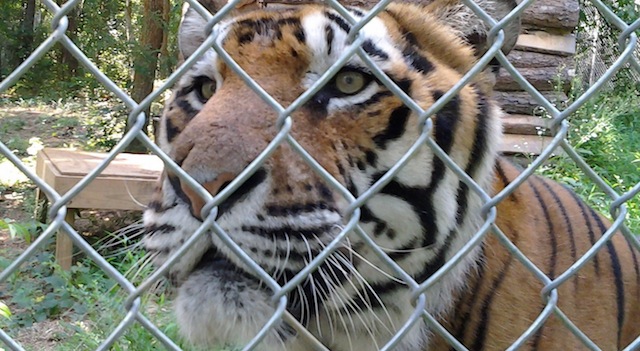
The ad caught my eye immediately.
[quote]Carolina Tiger Rescue offers a short-term and intensive experience for current or aspiring veterinary or zoology students. Students will spend 80 hours over two weeks working alongside one of our Animal Keepers. [/quote]
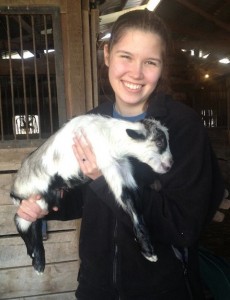 I was an undergraduate sophomore at the time, and not quite sure that I really wanted to drive down to North Carolina, stay with complete strangers and do something that sounded so… well… intense.
I was an undergraduate sophomore at the time, and not quite sure that I really wanted to drive down to North Carolina, stay with complete strangers and do something that sounded so… well… intense.
I had absolutely no experience with exotic animals, much less tigers, but had a pretty solid belief that I wanted to be a vet. So I sent in a cover letter and a resume, and before I knew it I had an interview set up during my spring break.
The Working Interview
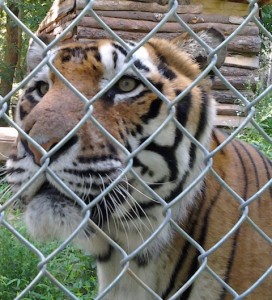 It took me 7 hours to get to the little tiny town in the middle of North Carolina where Carolina Tiger Rescue is located. I had no idea what to expect. Within minutes of being at the compound, I was snatched up by an animal keeper and given an introduction to the safety rules and regulations, as well as the food prep station.
It took me 7 hours to get to the little tiny town in the middle of North Carolina where Carolina Tiger Rescue is located. I had no idea what to expect. Within minutes of being at the compound, I was snatched up by an animal keeper and given an introduction to the safety rules and regulations, as well as the food prep station.
At the food prep station I was given a butcher knife and ten frozen chickens to cut into quarters. One of the keepers eventually came to fetch me, inspected my quartering work, and then loaded all the food in the back of an old, beat-up pick-up truck.
Finally we entered the compound and I met my first tiger. And my first ocelot, caracal, serval, kinkajou, binturong, bobcat, leopard, cougar and lion.
We didn’t even make it through the whole compound that morning. I had loaded up a banana on a stick to feed a binturong his fish oil capsule, and found that binturong unresponsive. It had died in the night, and the keepers carefully went in to retrieve the body.
We took it back to the main building, and they called the vet in to do a necropsy. Naturally, I asked to stay and watch. After the necropsy, I helped with the evening feed, got a brief tour, and helped wash and clean up.
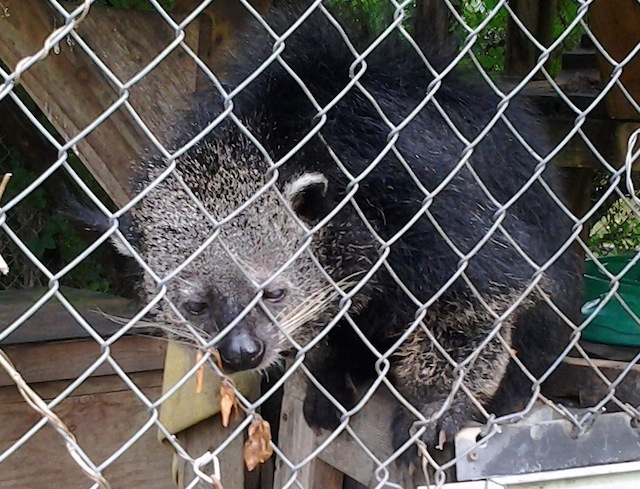
By the time the day was over, I felt that even just having had the chance to be there for that one day was the experience of a lifetime. When I got the email that I had passed the working interview, I was thrilled.
Lions, Tigers, and Binturongs, Oh My!
I headed back down for two weeks in the heat of summer. The three keepers were extremely helpful and friendly, and everyone on staff was amazingly dedicated. Over the next two weeks I learned the names of all 70+ animals at the rescue, and how to distinguish them from each other.
I was impressed by the safety measures taken by the rescue and the sensible and compassionate way that the animals were taken care of. I had the opportunity to help administer daily medications and monitor for intake, watch and assist with exams when the vet was on compound, and in general learn about the care and enrichment that the animals needed.
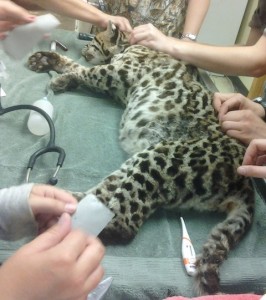
I even got to see a necropsy on a tiger that died of cancer. Though not all the tasks I was handed were pleasant, they were a necessity, and I really felt like I was contributing to the quality of the rescue with every task I completed.
I also had many chances to interact with the 8-week interns on the compound. They had come from all over the U.S. and had been chosen due to their applications and experiences.
While I had the freedom to basically choose what to get involved in during my time at the rescue, the interns had a slightly different experience. They were each given a section of animals as their own and monitored these daily. They did enrichment for the animals in their section, cleaned cages, assisted with compound maintenance, had to complete an intern project, and participated in weekly “classes” put on by the keepers.
Is This Internship For You?
While my time at Carolina Tiger Rescue may have been short, it was one of the most rewarding experiences I have ever had. Nothing is quite as terrifying as having a tiger stalk you from his water tub, or as exciting as the first time you produce the perfect tiger chuff.
The rescue taught me not only about exotic animal medicine and care, but also about the consequences of exotic pet ownership, the importance of safety around the animals, and the hard work that a few individuals go through to make the lives of rescued cats as rich as possible.
As a caution, it isn’t for the faint of heart or those who aren’t looking to do hard work: butchering animals, rebuilding dens, sorting through good and bad food, cleaning cages, cutting down poison ivy, boiling out fire ant dens, or building new cage enclosures can all be in a day’s work.
Follow the link here for more information about the internship programs at Carolina Tiger Rescue.
Elliott here: Thanks Melissa for sharing about this unique experience! I haven’t done a lot of work with big cats myself, but you only need to see a picture of my middle school bedroom to know that I was and remain kind of obsessed. During my externship at the National Zoo we did a couple of brief ophthalmic assessments on a female lion through the bars but that was it.
I think an experience like this will be a great addition to Melissa’s vet school applications. Can any of you recommend other similar rescue-type organizations that accept interns?
[google-map-v3 width=”350″ height=”350″ zoom=”5″ maptype=”roadmap” mapalign=”center” directionhint=”false” language=”default” poweredby=”false” maptypecontrol=”true” pancontrol=”true” zoomcontrol=”true” scalecontrol=”true” streetviewcontrol=”true” scrollwheelcontrol=”false” draggable=”true” tiltfourtyfive=”false” addmarkermashupbubble=”false” addmarkermashupbubble=”false” addmarkerlist=”Pittsboro, NC{}zoo.png{}#http://www.elliottgarber.com/carolina-tiger-rescue-veterinary-internship-with-big-cats/ Carolina Tiger Rescue Internship#” bubbleautopan=”true” showbike=”false” showtraffic=”false” showpanoramio=”false”]

Comments
There is actually another organization like this in North Carolina near to the Research Triangle Park- The Conservator’s Center in Mebane. Carolina Tiger Rescue used to be known as Carolina Tiger Park up until a few years ago, and was still an active breeding site for large cats. They changed management and mission, and now they are CTR. Conservator’s Center (CCI) exclusively does rescue, and has a more varied collection of exotic species. Both organizations are pretty awesome, and we’re lucky to have both so near to North Carolina State University’s CVM.
http://www.conservatorscenter.org/internship.cfm
Thanks for this info, Margaret! I had not heard about the Conservator’s Center but it sounds like another good place for getting this type of experience. I saw that history of Carolina Tiger Rescue as well and am glad their leadership had a change of heart — we definitely don’t need any more backyard big cat breeders.
The fact that there are two rescue organizations so close by makes me wonder how many unwieldy exotic species are actually out there pre-rescue. What vets work with them?
I don’t really know personally, I’m not affiliated with either organization. North Carolina does not require any license to own an exotic animal, and regulation only applies to specific species native to North America. We haven’t had incidences like Zanesville, Ohio recently- but it could potentially happen. There is definitely concern, though. I attended a certification course with local emergency workers and Zanesville came up, as well as how to deal with such a situation and who to contact for animal control. (Certification was Technical Large Animal Emergency Rescue – tlaer.org). And honestly, there are few ways to plan for such things aside from proper enclosures & maintaining good control over the animals- something CCI & CTR are very good at.
Another awesome opportunity for working with exotics is at Turpentine Creek Wildlife Rescue in Eureka Springs, AR. They have an amazing 6 month hands on internship which I have had the privilege of experiencing. These 6 months were the most heart wrenching and rewarding of all my animal experiences. I worked with lions, tigers, bears, cougars, servals, bobcats, and leopards, just to name a few. For more information see the website link :).
http://www.turpentinecreek.org/index.php/opportunities/internships-a-volunteers
There is a smaller group in Cocoa Florida. The group is called Central Florida Animal Rescue. WWW. CLFAR.Org. They are always looking for volunteers. I live next door and feel very lucky to be able to experience these big cats.
\
Thanks for the recommendation, Candy!